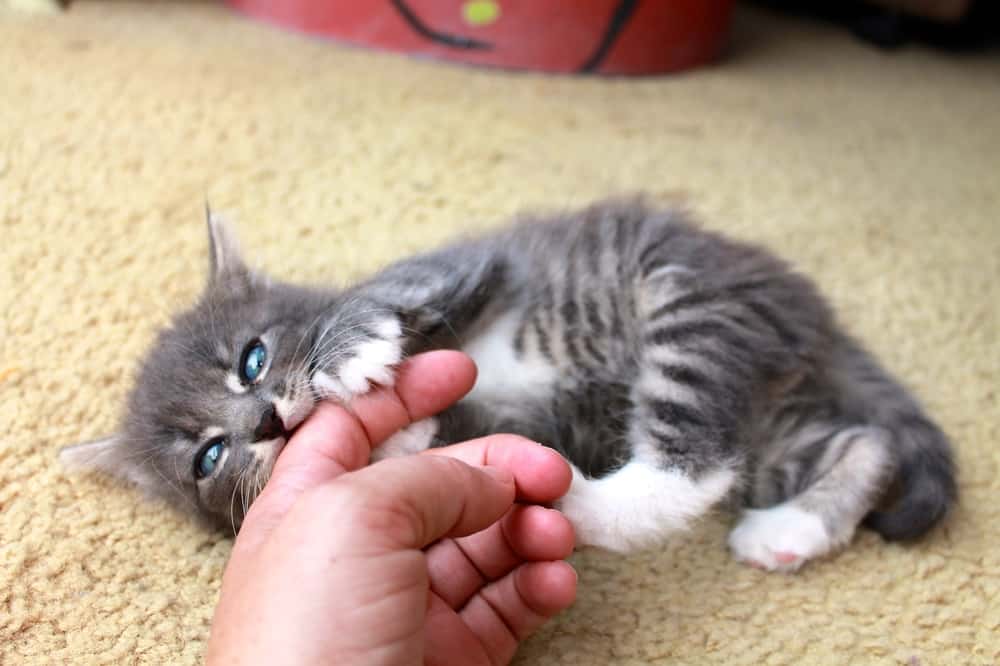Stop Your Cat From Biting

No-one wants a cat munching on their hand. Or face. Or anywhere else.
Cat bites can be painful and upsetting, not to mention the fact that they can also lead to infection and teach your cat bad habits. It can be especially harmful and distressing if your cat bites a young person in your home.
It’s therefore important that you stop your cat from biting. That’s why we’ve brought you all the tips, help and information you need to stop your fanged little feline from dominating your home. We’ve explored why cats bite, how common it is, signs to look out for, and easy ways you can stop it from happening.
Is It Normal for Cats to Bite?
Yes, it’s very normal for cats to bite gently. A cat not using their mouth to explore the world is like us not using our hands. So a gentle nibble while playing is okay. But drawing blood isn’t. If your cat can’t seem to distinguish the difference between the two, that’s when you’ve got a problem.
Though it’s normal for cats to bite gently during play, it’s not at all normal for a cat to bite roughly or aggressively – or draw blood. These things should never be excused, and they should always be addressed.
Why Do Cats Bite?
There are lots of reasons why cats bite. Here are the most common causes:
They Were Never Taught Any Better
When a cat is young, they don’t know that their teeth and claws can cause pain. They’re young, they’re naive, and they need to be taught some lessons. They’re blank slates, still yet to discover the perils of scratching, biting, and excessive interest rates on mortgages. Their mother teaches them these lessons, but if they’ve been taken from their mother and re-homed before they learn how to behave, they won’t know that they shouldn’t bite or scratch. That’s when it becomes your responsibility to teach them instead.
Predatory Instinct
We all know that cats love dragging home dead birds, mice, rats and other miscellaneous half-eaten animals. And that’s because they’re hunters by instinct. If someone is moving quickly, that can trigger the predatory instinct in a cat, and whatever’s moving will swiftly be chomped upon.
Overstimulation
if your cat is too stimulated by play or by something which is irritating them, they might eventually bite someone. Interestingly, they’ll usually take this out on a human rather than another cat. That’s because cats give pre-bite signals before the bite, and other cats can read these signals. Humans aren’t very good at reading these signals, so they’ll often miss the part where their cat is using body language to tell them that a bite is inching closer. We can learn to read these signals, but more on that later.
Understimulation
if your cat isn’t being stimulated enough, doesn’t have enough toys and doesn’t have any way of using up its excess energy, it’ll start finding inappropriate outlets, like biting, scratching and picking fights.
To Be Assertive
some cats want to assert their dominance, and do so by causing pain. This desire may come from fear, trauma, aggression, sexual energy or some sort of territorial urge.
Stress, Fear and Pain
if your cat is scared, nervous or in pain, they might act out by biting, just like a person might react to those same feelings by shouting at someone. If you can reduce these stressors, you can reduce the chances that your cat will bite.
If They Don’t Like What Someone Is Doing
Yeah, seriously. Say you’re humming, and your cat doesn’t like it, they might bite you. Or if another cat is eating and they don’t like it, the aggressive cat might bite the eating cat. The examples are obviously endless, but cats often bite to stop someone or something from doing something they don’t like, especially if that approach has worked in the past.
If They’ve Been Declawed
There are lots of reasons why you shouldn’t declaw your cat, but some people declaw their cats. If you’ve declawed your cat, you’ve taken away one of its tools, so it’ll compensate for the loss of that tool by using its mouth more regularly instead.
To Get Attention
Sometimes, less aggressive bites can simply be a tactic to get some attention. Like all of us, cats are big attention seekers. But though the reason is innocuous, the biting behavior still isn’t acceptable.
Habit
Lastly, if a cat often bites without being punished for it, they’ll just keep biting without any apparent reason.
From the above list, you might be able to work out why your cat is sometimes biting. But whether you can work out the problem or not, there are lots of things you can try.
How Can I Stop My Cat From Biting?
Here are the most effective ways to stop your cat from biting:
Congratulate Good Behavior
Obviously, the bad stuff is bad. But let your cat know that the good stuff is good. If your cat is playing gently, with no claws and little biting, congratulate them with tasty treats and encouraging sounds. The moment they stop this good behavior, withdraw the treats and congratulations. Over time, your cat will learn what’s right and what’s wrong, as they’ll associate good behavior with positive rewards.
Keep Your Fingers Away
Whenever you’re playing with your cat, use a toy, and encourage them to grapple, bite and play with the toy. If you use your hands and fingers instead of a toy, you’re teaching your cat bad habits. Even though it’s boring, you should do this even when your cat is a kitten. We all like having a kitten nibbling our fingers and hands, but it’s not so fun anymore once that kitten is grouchy, ten pounds and fanged.
Try Toys
More toys placed in various parts of your house means more appropriate things to bite, which means less inappropriate biting. More toys also means more stimulation – and if your cat is adequately stimulated, they’ll be less likely to run around your house causing mischief.
Stimulate Its Brain
cats are more intelligent than we give them credit for, and they need more stimulation than we realize. Consider using puzzles and toys to keep your cat stimulated. Use puzzle balls or other puzzles, both of which will stimulate your cat’s brain and body.
Remove Stressors From Your Home
Reduce loud noises, give your cat some space at home, tell your kids not to harass your cat, and close your drapes at night
Be Persistent and Consistent
Whatever means and measures you’ve decided upon, enforce them in a very persistent and consistent way – and ensure that everyone in your household is doing so too. If your cat is receiving mixed messages, you won’t stop them from biting.
See a Vet
If these solutions don’t work, it might be a good idea to see a vet. This is especially important if the biting seems to have come out of nowhere. If that’s the case, the cat might be acting out because of pain, and a vet is (of course) the best person to identify any pain or medical problems. If the biting behavior is habitual rather than a sudden or recent phenomenon, then seeing a vet probably isn’t necessary.
How Do I Know if My Cat Is Going to Bite?

There are lots of signs you can look out for:
- Flattened ears
- Big, dilated pupils
- Staring at your hand (or the other place it might bite)
- Stiffness in the body
- Twitching tail
- Hissing
- Spitting
- An arched standing posture
If your cat is doing these things, a bite is probably on the way. Instead of antagonizing the cat, you should back down and allow the situation to cool off. It’s best to prevent a bite from ever occurring at all.
Stopping a Kitten From Biting

To stop a kitten from biting, use the same tactics you would use for an adult cat—but of course, be a little more gentle. It’s especially important that you use toys with kittens, who need even more stimulation than fully-grown cats.
As we’ve mentioned, you should stop kittens from biting from the earliest possible age, as teaching lessons in the early weeks is always the best time. It’ll teach good habits, which will carry through to adulthood.
Teach them while they’re young, and you’ll never need to suffer the painful bite of an angry or overly-enthusiastic adult cat.
Should I Punish My Cat for Biting?
You shouldn’t punish them in the traditional sense. Hitting your cat, yelling or squirting it with water are all bad ideas, and your cat probably won’t learn from them. Instead, they’ll just see you as a competitive threat. Your cat will probably just see aggression as escalation, not as discipline.
You can try punishing your cat by ignoring it, as cats don’t like to feel like they’re being ignored. This mimics what a mother cat would do, so your cat will instinctively realize that it’s gone too far. You should even leave the room, so your cat absolutely understands the statement you’re making.
If your cat does bite you, don’t pull that body part away. Let’s say, for example, that your cat bites your hand. Your instinct is to pull your hand away. But that will encourage your cat to keep biting, and maybe even go for a harder bite. Instead, you should push your hand further into the cat’s mouth. Cats don’t like that, and it’ll probably let go, leaving your hand relatively unscathed. You should also vocalize a high-pitched “Ow!”, which mimics the sound another cat would make.
Can Cat Bites Be Harmful?
Yes, they’re often much more harmful than most people realize.
Cats have strange types of bacteria in their mouths, which can easily lead to hard-to-treat infections in the areas they bite. These infections can lead to swelling, flu-like symptoms and even (very occasionally) death. That’s because a cat’s fangs are designed to puncture swiftly and deeply, pushing the bacteria from their mouth right under your skin.
A small benign bite isn’t harmful, but if the bite draws blood or breaks the skin, the bite might become infected, and you should treat the bite immediately.
If you get bitten by a street cat in a place with some presence of rabies, make sure you go to a doctor as soon as you can, as rabies is always fatal if left untreated.
How Should I Treat a Cat Bite?
If your cat has bit you, one of your pets, or a person, you should treat the bite right away (especially it’s drawn blood or broken the skin).
First, squeeze the area around the wound, pushing blood out of it. If you push the blood out, you’re likely pushing out the bacteria too. Then wash the wound immediately under cold, running water before sponging the wound with a salt solution.
If the bite is deep, you should also see a doctor as soon as you can, who may recommend you take antibiotics.
What if I Can’t Stop My Cat From Biting?
Firstly, be patient.
The guidance in this article might take weeks or months to work, especially if your cat has already been biting for a while. But given enough perseverance, it should work over time. The longer the biting has been happening, the longer it will take to break the habit.
If you’ve tried everything in this guide for a long while, and none of it seems to be working, it’s probably time to see a behavioral specialist. A behavioral specialist might be able to observe and identify problems that you can’t, and if they can identify these problems, they can treat them. Often, a behavioral specialist will introduce medication, supplements or exercises.




